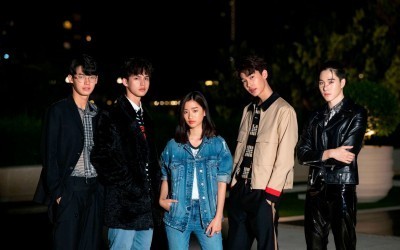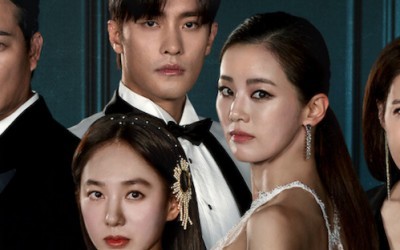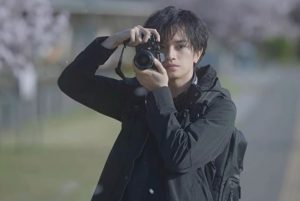Review Japan Movie "Love Like the Falling Petals (2022)"
Photographs have an amazing power on our memory. We can look at a picture from our childhood and be taken back to that time. Likewise, we can glance at a photo of our children when they were younger and wonder where the time has gone.
On this planet, we’re all given a finite amount of time to experience what this incredible world has to offer but in the end, everything can come tumbling down when the grim reaper comes knocking. And those feelings of dread and despair are captured in Love Like the Falling Petals beautifully.
Netflix’s latest Japanese film is far from perfect though. It’s a definite tear-jerker and undoubtedly a poignant picture, but it’s also a film that feels overlong and with a discombobulated theme around caring for the elderly.
That’s a big problem too, especially when the central protagonist is that very person this film is trying to paint in a questionable light.
I’ll try not to give too much away going into this one as it’s best to jump in blind. However, there is some serious tonal whiplash halfway through the movie that’s worth prefacing before you go into this.
The movie’s premise centers on what looks to be a fairytale romance as Haruto Asakura falls in love with hairdresser Misaki Ariake. The pair go on dates, connect well and even help one another embrace their hopes and dreams for the future. They seem destined to be together forever.
Unfortunately, Misaki is diagnosed with a crippling illness, and her world is instantly turned upside down. What follows from here is a film that changes from a lighthearted romcom to something far more mellow, bittersweet and heartbreaking. You really have to be in the right mood for this movie and given the two distinct tones this adopts, that’s a bit of a problem.
It’s also, unfortunately, mixed in with an ill-fitting commentary about the burden of looking after the elderly and how that can affect your relationship and career. It’s a really strange message and I’m not sure if that was the filmmaker’s intention or not.
This puzzling messaging ultimately causes the film to feel conflicting to watch. Am I supposed to lament Misaki still hanging about? Am I supposed to feel pity for Takashi taking on the financial burden of the family? Or am I supposed to see Takashi as an antagonist and rally behind Misaki? None of that is portrayed all that effectively and it’s a problem that ultimately holds this back from being a stronger watch.
The middle of this movie in particular is a great example of this, as Misaki turns from a lovable protagonist to someone that’s – at times – hard to rally behind. With her diagnosis starting to speed up, Misaki becomes a recluse, hidden away behind big sunglasses and head scarves. It’s hard to really engage with her until late on in the movie, during the heart-wrenching climax.
Production-wise, Falling Petals does have some nice shots and the musical score is pretty good too. The visuals – including the recurring motif of falling petals and cherry blossoms – is nicely shown. However, there are also some rather strange CGI establishing shots that feels a little jarring.
This is supposed to represent the passing of the seasons but honestly, given how much emphasis is placed on Haruto and his photography, I’m not sure why they the filmmakers didn’t just go the route of showing this on a polaroid picture, slowly fading out to show an establishing shot of Tokyo.
If you’re in the mood for a tearjerker though, you’re bound to find it with Love Like the Falling Petals, even with all its flaws. This is a poignant story and the lead couple certainly have some good moments together that help carry this along during the slower segments.
It’s just a pity that this one comes crippled with such confused messaging, as it could have been a great film. In the end this one is likely to be regarded as fleeting as cherry blossoms in season.
Love Like the Falling Petals Ending Explained
Love Like the Falling Petals Plot Synopsis
Love Like the Falling Petals’ premise centers on what looks to be a fairytale romance as Haruto Asakura falls in love with hairdresser Misaki Ariake. The pair go on dates, connect well and even help one another embrace their hopes and dreams for the future. They seem destined to be together forever.
Unfortunately, Misaki is diagnosed with a crippling illness, and her world is instantly turned upside down. What follows from here is a film that changes from a lighthearted romcom to something far more mellow, bittersweet and heartbreaking.
What is Misaki diagnosed with?
Misaki has been diagnosed with Progeroid syndrome. This is a rare genetic disorder that essentially mimics physiological aging, making affected individuals appear a lot older than they are.
For Misaki, there were some foreshadowed signs of this beforehand; Misaki complains about grey hairs to her hairdresser. She’s also starting to become more frail, with her bones and muscles starting to grow weaker. Unfortunately for Misaki, she doesn’t have long left before things begin rapidly accelerating.
Not wanting to be a burden to Haruto, Misaki leaves in the morning after the pair make love. Misaki breaks her lover’s heart, claiming she’s back with her ex again and she’s in love with him.
That’s obviously false, given she’s actually unable to bring herself to tell Haruto the truth and open up about her condition. And the next time we see her, Misaki has already aged a fair amount, with her hair coming out in clumps.
Why is Takashi’s relationship so strained?
Misaki’s brother, Takashi, postpones his wedding to look after Misaki as her condition worsens. This puts a burden on the family and there’s a fair amount of tension between Takashi and his partner. Not a lot of time passes but already Misaki is struggling to walk. She’s carried on Takashi’s back while sporting sunglasses and a head scarf.
At Christmas, Takashi has Misaki write a wish down to place inside a red sock. She writes “I want my suffering to end.” This is the wish she makes to herself. Her initial note though actually read that she wants to see Haruto – which Takashi decides to pursue for her.
Takashi shows up to see Haruto and explains what Misaki has been diagnosed with – and that her condition is getting really bad.
Haruto shows up numerous times at Misaki’s door to talk. She listens; he speaks. The pair try to rekindle what they had but Misaki cannot bring herself to face him. It’s pretty heartbreaking and foreshadows what’s to pass.
Do Haruto and Misaki meet up again?
During Misaki’s final moments, she heads out and tries to find Haruto at the studio. It’s winter and bitterly cold. She’s only got one more season left but she’s finally plucked up the courage to see her lover.
After seeing his photographs printed out and blown up for all to see, Misaki writes Haruto a letter detailing her thoughts and how happy she is that he took up photography. However, he only reads this letter after meeting Misaki one last time.
That final time is a bittersweet, heartbreaking encounter. Out in the snow, after Misaki’s fruitless visit to the studio, she falls over from exhaustion.
Haruto shows and helps her up, asking “are you okay ma’am?” He doesn’t recognize her. Misaki’s final moments are tinged in sadness but she at least gets to see Haruto one more time – even if he doesn’t realize it.
Does Haruto find the strength to carry on in life?
When Haruto finds out what happened, off the back of Misaki’s cremation, he’s understandably crushed. This is the last memory they share, but Misaki writes in her that that he should share his photos for when they meet up together again in the next life.
With this chapter of his life over for now – and Haruto deciding against committing suicide despite coming dangerously close with some scissors earlier on – Haruto heads back to work and doubles down on his photography.
“We photographers can only find the answer through the viewfinder,” His superior says, pointing out that those photos Haruto took at the exhibition – the ones taken to honour Misaki’s memory – are what keeps him going.
Haruto continues to struggle finding an answer and purpose to his life, but vows to remember Misaki’s memory every spring just like the fallen petals.
As the final credits roll, that overarching theme about photos being timeless rings true. We see all of this through black and white shots of their various hotspots together.
Is there a post-credit sequence?
Yes! Do not turn the film off too soon or you’ll miss one important scene at the end.
Here, we cut back in time to when Haruto snapped a photo of the Tokyo Tower for the first time. He was nudged by someone wearing red. After apologizing, this woman walks further into the crowd but looks back over her should while handing out flyers. And that woman? None other than Misaki.
It turns out Misaki actually knew Haruto before the hairdressers and it seems fate has played a part in bringing the two characters together again. Perhaps they’ll meet again in the next life after this one?
Other Articles
-

Recap "The Blue Whisper: Part 1" Episode 10
-

Recap "The Oath of Love" Ep 21
-

Recap "The Oath of Love" Ep 20
-

Recap "The Oath of Love" Ep 19
-

Recap "The Oath of Love" Ep 18
-

Recap "The Oath of Love" Ep 17
-

Recap "Forecasting Love and Weather" Episode 14 with Park Min Young, Song Kang
-

Recap "Forecasting Love and Weather" Episode 13 with Park Min Young, Song Kang
-

Recap "Twenty-Five Twenty-One" Episode 14 with Kim Tae Ri and Nam Joo Hyuk
-

Recap "Twenty-Five Twenty-One" Episode 13 with Kim Tae Ri and Nam Joo Hyuk
-

Recap "F4 Thailand: Boys Over Flowers" Episode 14
-

Recap "Love (ft. Marriage and Divorce) – Season 3" Episode 9
Genres
- Accident
- Action
- Adventure
- Alien
- Amnesia
- Ancient legend
- Animals
- Animation
- Arthouse
- Artificial Intelligence
- Award Winning
- Based on a Comic
- Based on True Story
- Betrayal
- Biography
- BL
- Bodyguard
- Bromance
- Business
- Chambara
- Childhood
- Christmas
- Cohabitation
- Cold Man
- Coma
- Comedy
- Concert
- Conglomerate
- Conspiracy
- Contract Relationship
- Corruption
- Crime
- Criminal
- Curse
- Dance
- Deity
- Demon
- Detective
- Disability
- Disaster
- Documentary
- Drama
- Eastern
- Educational
- Entertainment
- Environment
- Erotica
- Espionage
- Exorcism
- Exploitation
- Fairy
- Family
- Fantasy
- Fashion
- Feminism
- Food
- Foreign
- Friendship
- Game Developer
- Gangster
- Geishas
- Gore
- Goryeo Dynasty
- Grudge
- Gumiho
- Harem
- Hidden Identity
- Historical
- Horror
- Hostage
- Human
- Hypnotism
- Idol Drama
- Indie
- Instructional
- Investigation
- Jidai Geki
- Josei
- Kidnapping
- Kung Fu
- Law
- legal
- Lesbian
- LGBTQ+
- life
- Love Triangle
- Mafia
- Magic
- Manga
- Manhua
- Martial Arts
- Mature
- Medical
- melodrama
- Mermaid
- Military
- Miniseries
- Misunderstanding
- Monster
- Murder
- Music
- Musical
- Mystery
- Mythology
- Nature
- Neighbours
- Noir
- Novel
- Omnibus
- One shot
- Parody
- Phobia
- Poison
- police
- political
- Power Struggle
- Prison
- Professional
- Programmer
- psychiatry
- Psychological
- Reality
- Reality Show
- Reality TV
- Rebellion
- Religion
- Remake
- Republic
- Resurrection
- Revenge
- Rich Man
- Robot
- Romance
- RPG
- Rural
- Samurai
- Scholar
- School
- Sci-fi
- Seinen
- Serial Killer
- Short
- Sismance
- Sitcom
- Slapstick
- Slice of Life
- Society
- Soulmates
- Sports
- Supernatural
- Survival
- Suspense
- Swordsman
- Taiga drama
- Teamwork
- Tearjerker
- Teen
- Terrorist
- Thief
- Thriller
- Time Travel
- Tokusatsu
- Tomboy
- Tragedy
- Tragic Past
- Transmigration
- Trauma
- Treason
- Triad
- Underworld
- Unrequited Love
- urban drama
- Vampire
- Variety
- Variety show
- War
- Warrior
- Web Series
- Webtoon
- Werewolf
- Western
- Witch
- Workplace
- Wuxia
- Yakuza
- Yaoi
- Youth
- Yuri
- Zombie




